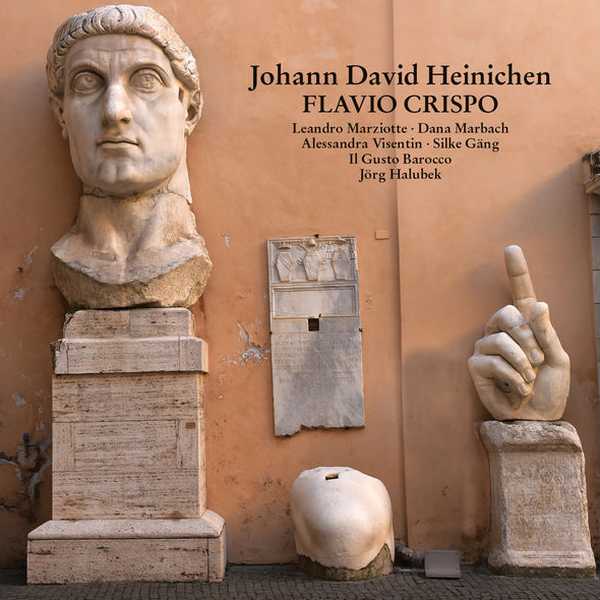
Composer: Johann David Heinichen
Performer: Leandro Marziotte, Dana Marbach, Alessandra Visentin, Silke Gang, Nina Bernsteiner, Tobias Hunger, Ismael Arroniz
Orchestra: Il Gusto Barocco
Conductor: Jörg Halubek
Number of Discs: 3
Format: FLAC (tracks)
Label: CPO
Catalogue: 5551112
Release: 2019
Size: 1.11 GB
Recovery: +3%
Scan: yes
Flavio Crispo
CD 01
Act I
01. Sinfonia. Allegro (I)
02. Sinfonia. Amabile e sempre piano
03. Sinfonia. Allegro (II)
04. Nè potrà il tuo favor
05. Non contrasti il fato ingrato
06. Tanta fierezza ove già tanto amore?
07. Non tutta renda si l’alma al rigore
08. Una fama miglior cercai trà l’armi
09. Il trionfo del mio sdegnio
10. Strisciò su queste luci d’Elena mia
11. Il dolce mio servaggio
12. Signor, in questo dì veggo adempisse
13. Basta à me luci adorate
14. Ohimè! Più che sincero
15. Chi chiedesse all’augelletto
16. Allor che a Costantino
17. Ohimè! Non credere, ch’io possa
18. S’appresti il trono onde sovrano
19. Se tal sull’alme regni
20. Sciolto dalle catene già lungo stuol
21. Ballo
22. Questo, onde Roma il mio venir onora
23. Cesare, il novo grado
24. Bella pace, in più placide cure
25. Che pensi far?
26. Che mia man porti la fede
27. Ben qualche speme
28. Se adorno di speme
CD 02
Act II
01. Sinfonia. Allegro (I)
02. Sinfonia. Larghetto
03. Sinfonia. Allegro (II)
04. Io, che so qual ver lui nutri odio in seno
05. Quel nodo, ond’ei paventa
06. Contaminata assai s’è l’innocenza mia
07. Non la madre, non l’amante
08. Teneri sensi qui detto lontananza
09. Con questa speme farò
10. Vincitor delle Gallie
11. All’empio il primo fulmine
12. Di felice messaggio apportator
13. Non perché veda di strano aspetto
14. Gioverà forse il far accorta Imilee
15. Sdegno tu cerca ov’io
16. Cosa, che per commando
17. Perdonate sembianze leggiadre
18. Che più resta fellon pronuncia il nome
19. Mio destino è aver in petto
20. Dì dal trifono à morte?
21. Arde fiera in ciel’ cometa
22. E di qualche sciagura
23. In veder l’altrui piacer
CD 03
Act III
01. Dunque morir degg’io?
02. Vieni, ò tosco, e scendi al cor
03. Ceda a tema vergogna
04. Questo sguardo
05. Gridar, piange, spirar, qual farò prima?
06. Vuoi di più, beltà sdegnata?
07. Sì, a Costantino andiam
08. Face sarà di furia
09. Dunque gli occhi dell’ alma immagin
10. Crude porte diserratevi
11. Questa nube, che sorge non permettan
12. Se chiama al soglio
13. Servi, il bagno chiudete
14. Vostre imagini noi non siamo
15. Signor, sua la tua fronte
16. Non tardar, impugna il folgore
17. Schiavi, l’iniqua ove più ferve il bagno
18. Già dal profondo
19. Prima la morte v’accorrò
20. Io vorrei saper d’amore
21. T’intendo, o ciel
22. Fantasma, che sorgesti dall’ abisso
23. Di procelle, e d’ombra a scorno
Following the premiere of Brescianello’s Tisbe, Johann David Heinichen’s Flavio Crispo is now the second discovery of a never-performed Baroque opera in an interpretation by Il Gusto Barocco. This Italian opera by Heinichen, one of the most valuable documents of its times in matters of compositional history, had been forgotten for some three hundred years until the ensemble premiered it in 2016. The historical circumstances behind this opera are very special: a quarrel involving the two world-famous castrati Senesino and Berselli caused a scandal that prevented the premiere of Heinichen’s opera at the Dresden court. Some anecdotes relate that the singers accused the composer of imperfect knowledge of Italian and tore the score to shreds during the rehearsal process while he looked on. Others state that Handel had wooed away the Dresden singers during a journey from Italy to London. The score is a masterpiece.
As a casual victim of circumstances – jealousy, denigration and low blows − Johann David Heinichen’s opera Flavio Crispo was never performed during its composer’s life; during repetitions in Dresden, insults flew back and forth between him and some Italian singers, which led the piece to be removed from the programme and never completed. Although in reality, only a few pages of music are missing from the integral score… Consequently, this is the first discographic publication of the opera, with the complete music composed in 1720. It reveals a composer at ease in both the sharp and complex language of Germanic tradition, and the formal and vocal freedom of Italian opera – which Heinichen had studied closely during a long stay in Venice. There, he met the Elector of Saxony (Frederick Augustus II of Saxony) and future King of Poland (Augustus III of Poland), who hired him to his court in Dresden, at the time one of the largest hubs in European culture. Heinichen soon took up the torch from Antonio Lotti who had composed Italian operas for the court of Dresden for a few years, and his Flavio Crispo was meant to be his contribution to the genre. But unlike Lotti, Heinichen called upon a highly-flavoured orchestra: horns, oboes, flutes, in addition to strings and continuo, and winds to which he gives a fair amount of highly-virtuosic movements. Unfortunately for the composer, he was never able to hear his masterpiece, as the King of Poland dismissed the few Italian singers who had risen up against the partition under a futile pretence; no one else was able to sing these roles, and the score fell into obscurity. This was until it was rediscovered and showcased by the ensemble Il Gusto Barocco and its music director Jörg Halubek, in a 2015 live recording. At long last, Herr Heinichen!